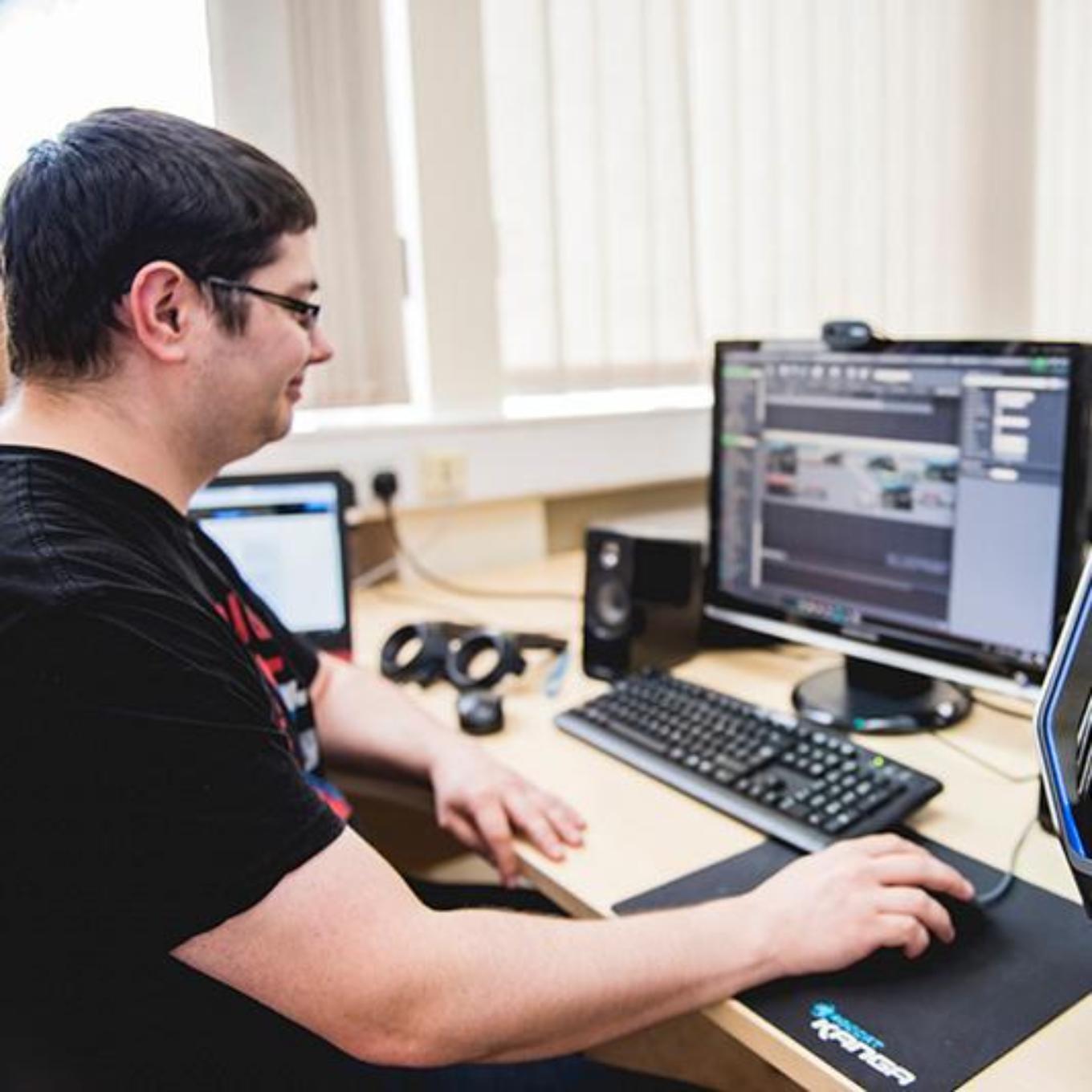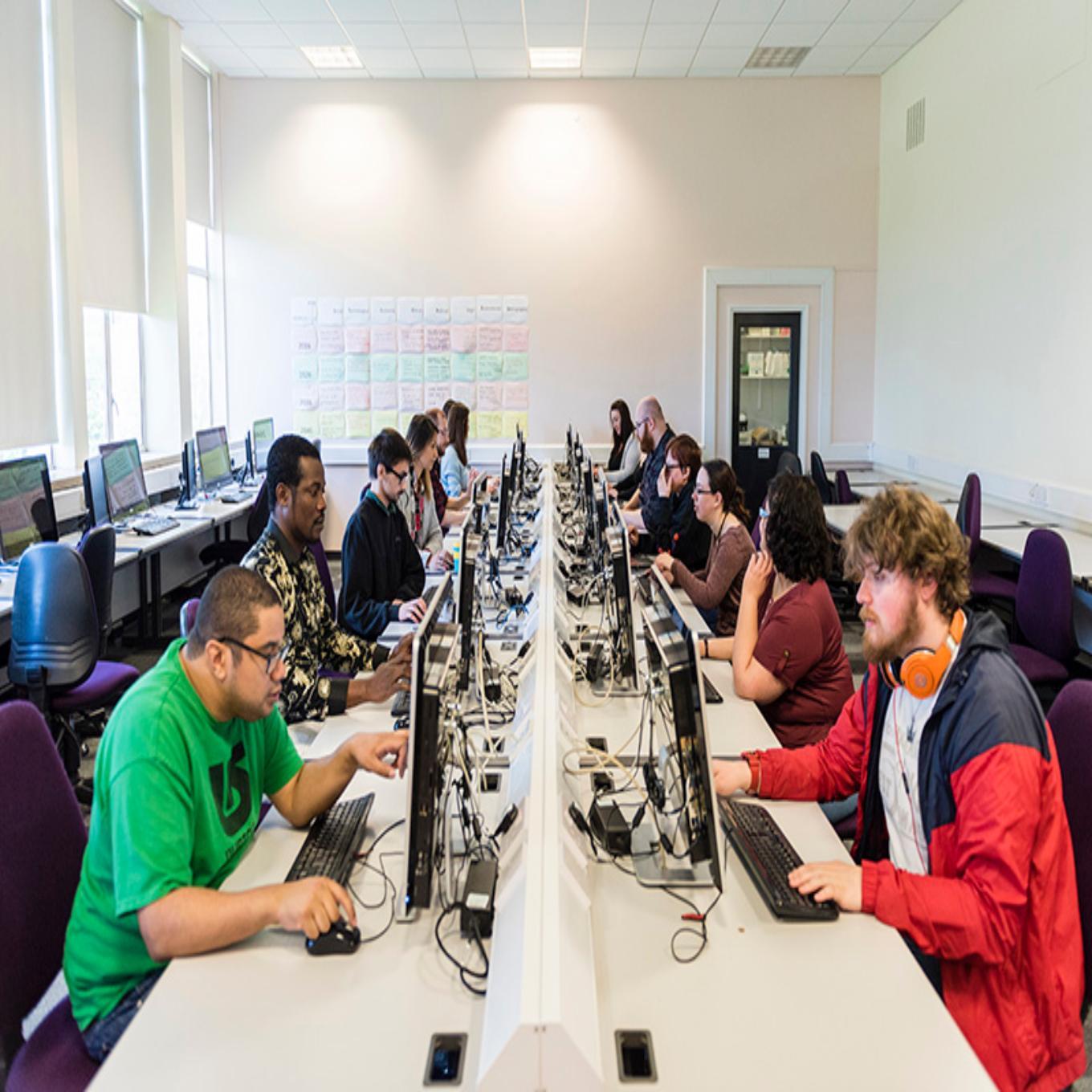MSc Computer Science

Course details
Year of entry
2025
Duration
1 YR (FT) 2 YRS (PT)
Institution Code
G53
Location
Wrexham
Course Highlights
Research active
department in future and emerging technologies.
Access
to a wide range of latest hardware and software.
Opportunity
to qualify for CISCO accreditation.
Why choose this course?
The MSc Computer Science degree aims to build upon the knowledge acquired at undergraduate level and provide students with advanced skills and expertise in specific areas of computer science.
It will allow students to delve deeper into specific areas of computer science, such as artificial intelligence, machine learning, and data science, and engage in research to contribute to the advancement of knowledge in computer science. Using advanced theories students will be able to solve complex problems, lead software development projects and address real-world software engineering challenges.
This course will:
- Allow students to focus on specific areas of computer science, such as artificial intelligence, machine learning, and data science.
- Foster a research-oriented mindset and provide opportunities for students to contribute to advancement of knowledge in computer science.
- Using advanced knowledge and understanding enable students to solve complex computational problems effectively addressing real-world software engineering challenges.
- Encourage the development of skills such as critical thinking, problem solving, project management and effective teamwork.
- Promote an understanding of the ethical and social implications of computer science and technology and encourage students to critically analyse the impact of technology on society, addressing issues such as privacy, security, and promote responsible and inclusive computing practices.
- Foster a culture of lifelong learning and professional development by encouraging students to stay up to date with the latest advancements in the field of computer science.
Key course features
- Focus on specific areas of computer science, including artificial intelligence, machine learning, and data science.
- Cultivate a research-oriented mindset.
- Opportunities to contribute to the advancement of knowledge in computer science.
- Utilise advanced knowledge to solve complex computational problems.
- Address real-world software engineering challenges effectively.
- Develop critical thinking, problem-solving, project management, and teamwork skills.
- Understand the ethical and social implications of computer science.
- Analyse the impact of technology on society.
- Address issues like privacy, security, and promote responsible and inclusive computing practices.
- Foster lifelong learning and professional development.
What you will study
The MSc Computer Science programme aims to build upon the knowledge acquired at undergraduate level and provide students with advanced skills and expertise in specific areas of computer science. It will allow students to delve deeper into specific areas of computer science, such as artificial intelligence, machine learning, and data science, and engage in research to contribute to the advancement of knowledge in computer science. Using advanced theories students will be able to solve complex problems, lead software development projects and address real-world software engineering challenges.
Students will study 6 core modules of 20 credits each, followed by a 60 credit dissertation, making a total of 180 credits.
Modules
- Artificial Intelligence
- Secure Computing
- Advanced Data Structures and Algorithms
- Advanced Machine Learning
- Database Systems and Data Analytics
- Research Methods for Digital Technologies
- Dissertation
The information listed in this section is an overview of the academic content of the programme that will take the form of either core or option modules. Modules are designated as core or option in accordance with professional body requirements and internal academic framework review, so may be subject to change.
Entry requirements & applying
The standard entry requirements for these programmes are an honours degree of at least 2:2 classification in a Computer Science related subject area, or equivalent in any science-based degree with a strong computing and/or engineering element. In some cases, applicants with substantial commercial or industrial experience can be accepted, subject to interview and references.
Teaching & Assessment
Teaching and Assessment
Teaching
The computing program suite employs a diverse range of cutting-edge industry tools and software, complemented by innovative teaching methods. This dynamic approach not only imparts industry-relevant skills but also empowers students to elevate their work to new heights when possible. The entire staff enthusiastically embraces the active learning framework (ALF), resulting in numerous enhancements to the teaching and learning experience.
Assessment
Assessments in computer science at the university level are designed to evaluate students' understanding, application, and proficiency in various aspects of the discipline. These assessments encompass a diverse range of methods, including:
- Coursework and Projects: Assignments and projects provide hands-on experience, allowing students to apply theoretical knowledge to real-world scenarios. This may include software development projects, research papers, or problem-solving tasks.
- Coding Assignments: Practical coding assignments assess students' programming skills, logical reasoning, and ability to develop efficient and effective code.
- Group Projects: Collaborative projects evaluate teamwork, communication, and the ability to work in diverse teams, reflecting the collaborative nature of the tech industry.
- Presentations: Students may be required to present their findings, solutions, or project outcomes, enhancing their communication and presentation skills.
- Laboratory Work: Practical sessions in computer labs assess students' ability to apply concepts, troubleshoot issues, and work with various tools and technologies.
- Problem-solving Exercises: These exercises challenge students to solve complex problems, encouraging critical thinking and analytical skills.
- Reports and Documentation: Writing reports or documenting project processes assesses students' ability to communicate technical information clearly and concisely.
Personalised Support
The department follows a well-established open-door approach, actively interacting with students, alumni, and industry stakeholders. Essential information and communication avenues are facilitated through tools like Teams and Moodle. Additionally, every student is assigned a personal tutor, fostering regular meetings, while additional personalized support is extended to part-time students through the Virtual Learning Environment (VLE).
Career prospects
Our Careers & Employability service is there to help you make decisions and plan the next steps towards a bright future. From finding work or further study to working out your interests, skills and aspirations, they can provide you with the expert information, advice and guidance you need.
One obvious advantage of a Computer Science master’s degree is that students become more employable. Jobs include, but are not limited to:
- Software Engineer/Developer
- Data Scientist/Data Analyst
- Artificial Intelligence/Machine Learning Engineering
- Research Specialist
- IT Consultant/Systems Analyst
- Project Manager/Technical Lead
- Software Architect.
Employability Features Built into the Course:
- Advanced Technical Skills: Graduates acquire advanced technical skills in areas such as programming, data analysis, artificial intelligence, machine learning, and cybersecurity, making them highly desirable candidates for technical roles in various industries.
- Specialised Knowledge: The course offers opportunities for specialisation in specific areas of computer science, allowing graduates to tailor their expertise to match industry demands. This specialisation enhances their competitiveness in the job market.
- Research Experience: For students interested in research-oriented careers, the course offers opportunities to engage in research projects, contributing to advancements in the field and preparing students for roles in academia or industry research labs.
- Professional Development: the course includes modules or workshops focused on professional skills development, such as communication, teamwork, project management, and leadership, which are essential for success in the workplace.
- Networking Opportunities: Students have the chance to network with industry professionals, alumni, and fellow students through seminars, workshops, career fairs, and alumni events, expanding their professional network and potential job opportunities.
Fees & funding
You do not have to pay your tuition fees upfront.
The fees you pay and the support available will depend on a number of different factors. Full information can be found on our fees & finance pages. You will also find information about what your fees include in the fee FAQs.
All fees are subject to any changes in government policy, view our postgraduate fees.
Programme specification
You can see the full programme specification here.International
This course is open to international students, for information about the university’s entry requirements for EU/international students, please visit our international section.


